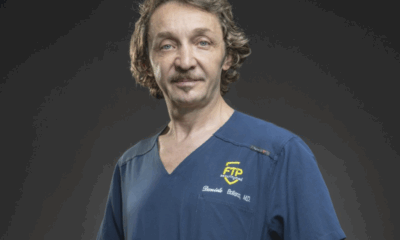Medical doctors and Surgeons
Post-Bariatric Surgery and patient management
After achieving a significant milestone such as weight loss through bariatric surgery, many people face a new challenge: excess skin. Skin does not always adapt quickly to a new silhouette, leaving visible marks and causing discomfort. This is where post-bariatric plastic surgery comes into play, a specialisation focused on reshaping the body and restoring patients’ confidence. In a recent interview, Dr Claudio Ligresti, a specialist in General and Plastic Surgery and an associate professor at the Plastic Surgery Specialisation School of the University of Siena, delved into the challenges and solutions in post-bariatric surgery. Dr Ligresti, who worked at the Asti Hospital Health Authority for 35 years, initially as a general surgeon and later as a plastic surgeon, heading the plastic surgery unit, shared insights into his reconstructive approach for patients suffering from severe obesity who have lost significant amounts of weight, often exceeding 100 kilograms.
Assessment and eligibility for surgery
Before undergoing surgery, it is essential to assess the patient’s condition. Dr Ligresti emphasised the importance of a thorough evaluation to determine a patient’s suitability for surgical procedures. Eligibility is based on two types of criteria. «The first criterion is medico-legal, which allows us surgeons to admit patients under the National Health Service’s provisions», he explained. These criteria, known as LEA, are crucial in distinguishing patients who can or cannot undergo surgery, based on parameters such as BMI, which must not exceed 30.

«Another inclusion parameter, recognised and regulated by the regions, concerns dermatological issues such as chronic skin inflammation and the quality of residual fat after weight loss», Ligresti specified.
Challenges in Post-Bariatric Surgery
One of the major challenges in post-bariatric surgery is chronic fat inflammation. «This ongoing inflammation, over the years, is somewhat akin to radiotherapy, causing chronic skin inflammation», the doctor explained. To minimise these risks, Dr Ligresti employs advanced technologies, including state-of-the-art electrosurgical tools and negative pressure devices, to manage and reduce post-operative complications.
Excess skin is not merely a cosmetic issue but can lead to psychological distress, dermatological problems, and functional limitations—all of which must be addressed by a team of professionals.
«I am one of the few plastic surgeons performing leg lifts, from the knee to the ankle, which is extremely challenging due to functional, neurological, and vascular issues. It is very easy to make mistakes – he said -. However, in certain cases, when the leg has a column-like appearance, with the thigh and lower leg being nearly the same volume, something must be done to restore proportion. Achieving harmony is one of the primary goals of our surgery».
A multidisciplinary approach
Post-bariatric surgery requires deep medical knowledge and sensitivity to patients’ needs. Dr Ligresti highlighted the importance of recovery that considers both physical and emotional aspects.
«The doctor-patient relationship is fundamental in our field. It is essential to understand not only the physical needs but also the emotional needs of our patients to ensure a complete and harmonious recovery».
Continuous psychological support is central to Dr Ligresti’s approach: «My phone is full of messages, even on Sundays, because this type of patient needs reassurance».
Patients often require several procedures to achieve an optimal outcome. «Recovery time between procedures is essential,” Dr Ligresti noted, “to allow patients to recover blood, protein levels, and even their social standing, as one cannot always be on medical leave. Two major procedures per year are the maximum we perform, or three if the third is a minor one, such as liposuction».
However, not everyone shares this cautious approach. «Unfortunately, I hear of patients undergoing two or three surgeries in a single day, which is extremely dangerous for the patient and detrimental to the reputation of the surgery we practise today, as it can result in unacceptable outcomes».
Patients need a multidisciplinary approach to ensure serious treatment, where various professionals work in synergy for the patient’s well-being «The fact that I am an ordinary member of the SICPRE [Italian Society of Plastic, Reconstructive and Aesthetic Surgery] and a delegate for post-bariatric surgery is not a guarantee of safety—because negative outcomes can happen to anyone—but at least it reflects professional seriousness».
Dr Ligresti continued, «My team includes psychological professionals to assist patients before, during, and after procedures», emphasising the importance of a holistic approach that considers not only physical but also mental and emotional aspects of recovery.
A relationship of trust often lasts for years: «These are patients who need comprehensive support—from the psychologist to the plastic surgeon and even the aesthetic doctor – Ligresti said -. It is emotional for me to see these testimonies, to hear from patients after years who have regained confidence and achieved their goals. This work, beyond financial gain, is driven by great passion».
Every procedure, Ligresti concluded, «is not just an aesthetic transformation but a step towards improving the patient’s quality of life».
Upcoming events
In this spirit of multidisciplinarity, Dr Ligresti will coordinate the “3rd OMG Day – Obesity Multidisciplinary Group,” an event featuring 22 experts from fields such as nutrition, psychology, bariatric and plastic surgery, dermatology, pharmacology, and healthcare legislation. The event will take place on 27 January 2025 at 19:30 in Turin, at “Piazza dei Mestieri,” Via Jacopo Durandi, 13. It will provide a platform to address patient questions in collaboration with Patient Associations. Those wishing to participate can send their questions to the Organising Secretariat (infoequipeservice@libero.it) by 20 January.




































